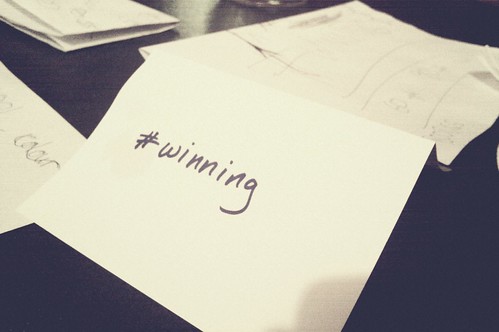Posts Tagged ‘tags’
creating flickering shadows in a cave
August 5th, 2011 • 2 comments tech
Tags: a moveable feast, art, blather, camtasia, creation, creativity, hemingway, jing, koha, libr559m, module 4, opac, prosentient, quantity, screencast, self-reflection, social media, tags, youtube
I find I have a block when it comes to thinking about the social-ness of creativity. I tend way more towards the “huddle in the dark and make things up and don’t show anyone until it’s ready” model of art making. Blogging and tweeting and the like doesn’t feel like it’s creation at all: it’s all just blather you do to keep from really working. (I blame reading Hemingway’s A Moveable Feast at a formative age.)
I realize I’m using terms like art to talk about 90-second library videos here, and that that’s kind of weird. I’m not going to apologize for it though.
So creating something like this little screencast about tagging in Koha using Jing feels more like my idea of creativity. I sat here on my bed in my room, downloaded the software, wrote a short script, pressed record and then uploaded it to the site. It felt like no one was involved and it was easy to pop up onto the web. It’s not encouraging you to tweet about it while you’re doing it, just the finished product. I like how it creates an unintelligible but relatively short URL to promote Tweeting and the like, but that’s as social as this process got.
Part of that is because Jing wants you to Go Pro so you can create mp4 files and presumably then you’d be able to upload your video to YouTube or something where people actually are, watching video. And it wasn’t the pure solitary artist experience either. For that I’d need the ability to actually edit the video, to sit here laboriously sweating over each frame (which I’ve used Camtasia for in the past and it lends itself well to that, but I wanted to try something new and simple for this little activity). This is social because it’s not prompting a lot of agonized self-reflection, just the “do something and get it out there” mentality.
I’m not sure that creates greatness but quantity has its own quality, I suppose.
rss for libraries
July 15th, 2011 • 5 comments library, tech
Tags: badass, catalogue, community, libr559m, module 1, opac, rss, school, social media, tags, twitter, updates
I don’t really understand why libraries wouldn’t use RSS. Maybe if your library doesn’t do anything you want to keep people updated on?
A really basic use for RSS (and Twitter) is to have a constant stream of interesting things past your eyes. For a library, spotting the things in those streams that might be useful for passing on to their users is great. It shows they aren’t siloed off in their own little world of books, and acknowledges that the world of the internet is part of the library. Even something as simple as subscribing to feeds from your user groups’ websites to know about the events they’re having is a big deal. That’s how you become part of the community. You can’t rely on people coming into the library to tell you things. You have to be proactive and give the users a way to shape their own experiences with your institution.
An example of things librarians can do to make their catalogues more accessible with RSS is to make it easy to set up RSS feeds of OPAC searches or tags or lists. If as a user I come to the site looking for books with strong female protagonists and I find that the users have tagged a pile of great books with “badass heroines”, if I can subscribe to that tag cloud those books show up in my feedreader that’d be sweet.
RSS can push the library out into people’s consciousness without requiring them to come all the way to the site to see what’s new. People are lazy and if they can get the information they want given to them in the way they want it, that’s great.
social media glossary: #hashtags
July 13th, 2011 • 2 comments tech
Tags: ala, backchannel, charlie sheen, chris messina, conference, glossary, hashtags, irc, l33tsp33k, libchat, libr559m, module 1, social media, tags, twitter
Hashtags (#hashtags) are a way to label, collocate and provide meta-commentary for online communication.

Closely related to the idea of tagging in general they were originally conceived of in 2007 by Chris Messina. Hashtags have primarily spread through Twitter where with the 140 character limit, space for organization is at a premium. Using the # symbol smashed into the tags without spaces makes hashtags uniquely searchable.
Since Twitter integrated their function to make them clickable they’ve become an excellent way to bring together tweets from many different users about a subject. By 2011 many conferences (including ALA’s events) have quasi-official backchannels set up through hashtags, like #ala11. Through the use of this ungrammatical tagging (with its roots in irc channels) a person doesn’t have to follow everyone at a conference to get an idea of what’s going on. A saved search for a hashtag covers much more ground, and can be easily abandoned when the event is over.
Hashtags are also good for more ad-hoc tweetable events like #libchat, as well as a means to participate in memetic trends (such as Charlie Sheen’s #winning earlier in 2011). Being a relative of leetspeak the use of hashtags can also be an important internet in-group signifier.